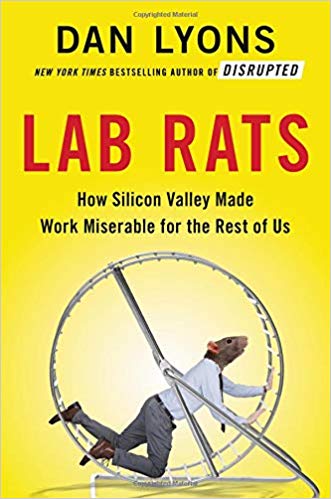You have /5 articles left.
Sign up for a free account or log in.
 Lab Rats: How Silicon Valley Made Work Miserable for the Rest of Us by Dan Lyons
Lab Rats: How Silicon Valley Made Work Miserable for the Rest of Us by Dan Lyons
Published in October of 2018.
How many of you work in open offices?
Have you been required to participate in employee training designed to discover your “personality type”?
Have the leaders of your campus unit become enamored with online collaboration and performance tracking platforms?
Higher ed, it turns out, is far from immune from falling victim to the latest corporate fads designed to maximize employee productivity.
The philosophy of the lean startup may have originated in Silicon Valley, but we are all one over-zealous university boss away from being turned into “agile” performers operating in a disrupted campus Holacracy.
Academic readers of Dan Lyons new highly amusing and deeply disturbing book, Lab Rats, will mostly be grateful not to be employed in tech.
From the vantage point of a higher ed industry under siege from the forces of demographic decline and state disinvestment and cost disease, working at a hip startup with nonstop free food and billion-dollar valuations might feel attractive.
We can be forgiven for believing that if we had just chosen to pursue a career at Facebook, that our days would be less filled with existential angst about the decline of our entire higher ed industry.
Reading Lab Rats should convince most of us that despite the seepage of some crazy management ideas past our campus gates, compared to the New Economy, we have it pretty good.
Lyons is precisely the right cranky writer to chronicle the insanity of organizational cultures within the technology world. For most of his career, Lyons was a print writer and editor - working at Forbes and then being laid off at Newsweek when the magazine folded. In his last book, Disrupted (see my review), Lyons wrote about his disastrous pivot from journalism to marketing at the company HubSpot.
Lab Rats takes the story of the crazy culture that he found at HubSpot, one characterized by disorganization and cruelty masked as enlightened new management thinking, and applies this narrative to the larger world of work.
What Lyons finds is that his experience at HubSpot was emblematic of a new way of working.
In this new employment world, companies follow the Netflix prescription of treating employees as “a team, not a family.”
In this new way of working, every employee should think of themselves as a “startup of one.” The company owes no loyalty to the employee, as jobs are only “opportunities to learn,” and the expectation is that everyone will move on every couple of years.
In the new world of work, there are no job security or other employee protections. We are all gig workers now.
To the extent that higher ed has resisted some of the worst impulses of the new way that companies seem to think about work, we should be grateful. Of course, those not on the tenure track and academic staff, remain vulnerable to being subjected to the latest productivity trend.
Higher ed should not only be a place where students are taught, and knowledge is created. We should also strive to develop secure, calm, and sane work environments. Colleges and universities can be, and mostly are, wonderful places to work.
Emulating the values and workplaces practices of the latest hot tech startup should be resisted at all costs.
What books can you recommend about workplace fads and dysfunctional organizational cultures?
What are you reading?




